Can You Scoop Cat Litter While Pregnant? 7 Vet-Approved Tips
By Brooke Bundy
Updated on
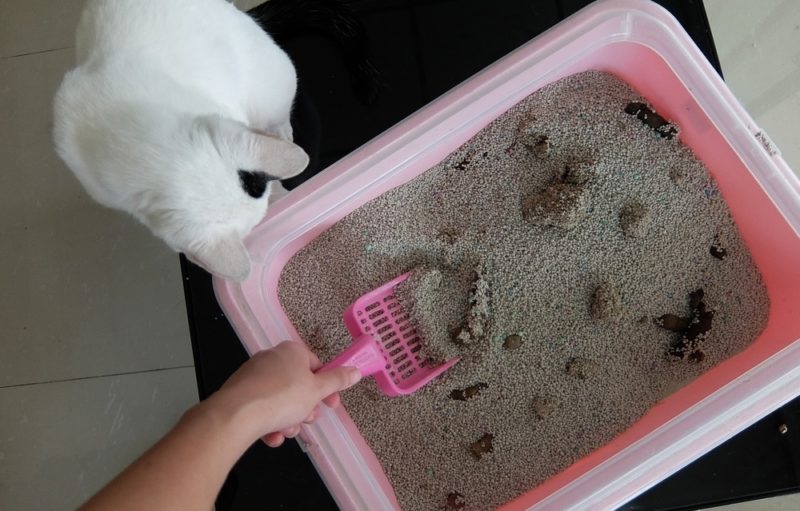
Click to Skip Ahead
You may have heard that you can’t scoop cat litter while you’re pregnant, but do you know why? It’s because of the potential for contracting toxoplasmosis, a disease that can be transmitted through cat feces. Approximately 30 million Americans have been infected by toxoplasma. Most healthy individuals show mild symptoms or are asymptomatic, but the disease has a terrible reputation because of what it can do to unborn infants. Children with mothers who were infected for the first time with toxoplasma during or soon before pregnancy may develop problems with their vision or mental health. In some cases, toxoplasmosis may even cause miscarriage.
However, there’s no reason to rehome your cat when you receive a positive pregnancy test, and you can still scoop the litter box as long as you take certain precautions. It is however recommended that some-one else take over litter box duties while you are pregnant. There are only limited ways you can contract toxoplasma, and they’re all largely preventable. If you take extra precautions during your pregnancy, you should be able to keep your fur baby while not risking your human child’s long-term health.
Why Are There Concerns About Scooping Cat Litter While Pregnant?
Toxoplasmosis is caused by a protozoan parasite (Toxoplasma gondii) that can be transmitted in cat feces. In healthy individuals, toxoplasma infection usually doesn’t cause any symptoms. Rarely, however, it can cause vision problems and flu-like symptoms, so visit your doctor if you’re having eye trouble and suspect exposure. If you have a compromised immune system, you’re more likely to develop symptoms such as fever, rash, muscle aches, and swollen lymph nodes. Treatment is available through your doctor. Always visit your doctor if you begin to have blurry vision, eye pain, or floaters since eye disease is a possibility.
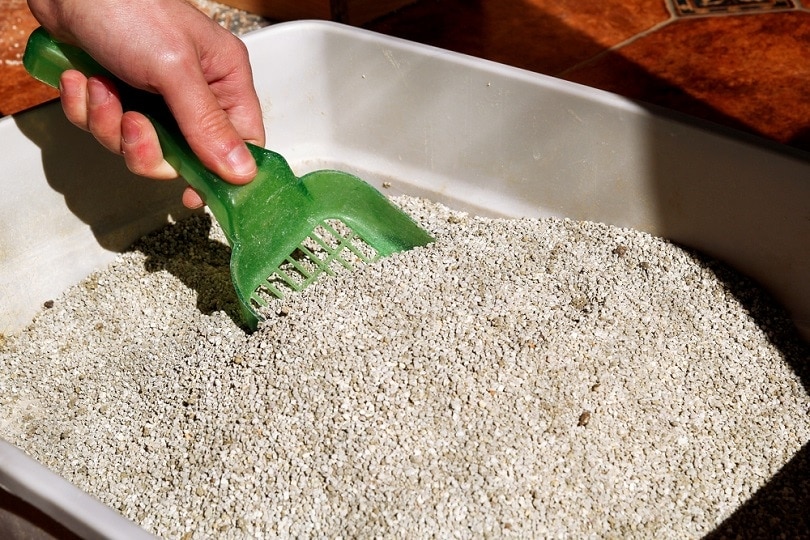
While toxoplasma is unlikely to seriously harm an adult, it can cause serious damage to a developing fetus. The problem comes if you are exposed to toxoplasma for the first time when you are pregnant. The risk of this is thought to be quite small. If you suspect you’ve been exposed to toxoplasmosis shortly before or during pregnancy, tell your doctor so that they can monitor you and your baby for symptoms. If you have been infected previously you will have life long immunity. There are thought to be around 3-4000 cases of mother to baby transmission (congenital) each year in the USA. However, there are around 3.5 million births each year in the USA for comparison.
How Toxoplasmosis Spreads
Cats only acquire toxoplasma by hunting small prey such as rodents, or through their mothers that do. But cats aren’t the only culprit. Most people who are infected by the disease actually contract it by eating under-cooked meat or unwashed produce contaminated by soil—not from their cat’s litter box. Additionally, it’s commonly found in the soil, so you may also contract the disease if you don’t wear gloves while gardening or if you drink water that hasn’t been treated properly.
While the risk of catching it from your feline isn’t as high, especially if you have an indoor cat who isn’t on a raw food diet or hunting, toxoplasma is still worth taking precautions against since it can cause severe problems with your unborn child.
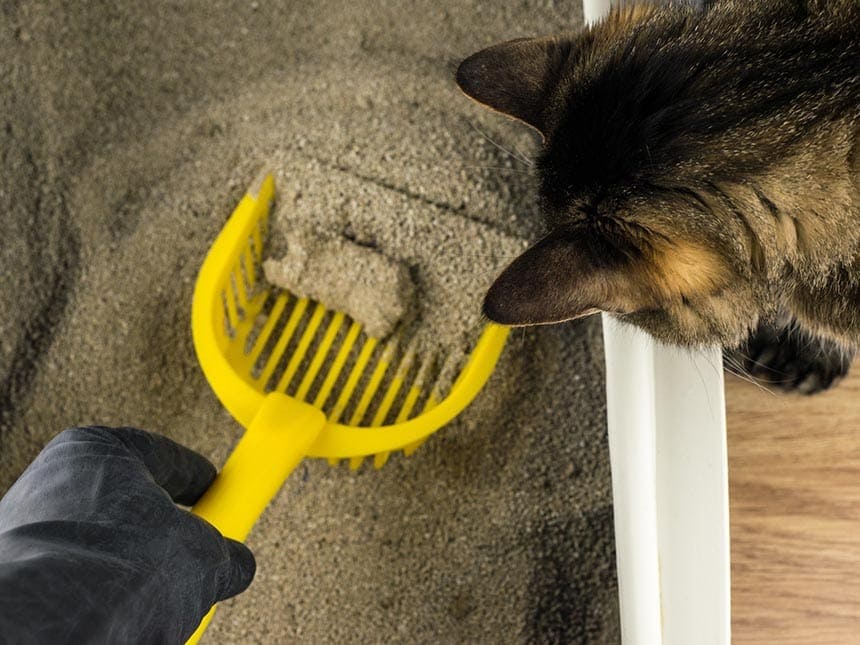
As your cat’s feces dries, toxoplasma becomes infectious. Thus, it is thought that even inhaling litter dust can expose you to toxoplasma. This is one reason why pregnant women should wear a mask if they must change the litter box while they’re expecting. The parasite doesn’t become active in cat feces until it’s been languishing in the litter box for more than 24hrs, so scooping the litter at least daily should significantly reduce the risk. You can also contract the disease by accidentally ingesting residual cat feces on your hands after changing the litter, which is why you should always thoroughly wash your hands after handling and wear gloves while you’re pregnant.
So, Can You Scoop Litter While Pregnant?
If you’re pregnant and have a cat, but there are other adults in your home with you, it’s best to let someone else scoop the litter box for the extent of your pregnancy. However, if you’re the only one in the home and must clean the litter box, you can scoop the litter box as long as you take some safety precautions.
The 7 Tips for Keeping You Safe When Scooping Cat Litter
1. Always wear a disposable mask and gloves
After COVID-19, it’s no big deal to whip out a mask and some gloves. Since you can be exposed to toxoplasma by touching the litter or breathing in aerosolized pathogens, this double protection should greatly reduce your risk of contracting the disease. Also, always wash your hands thoroughly after cleaning the litter box and avoid touching your face until you’ve washed your hands.
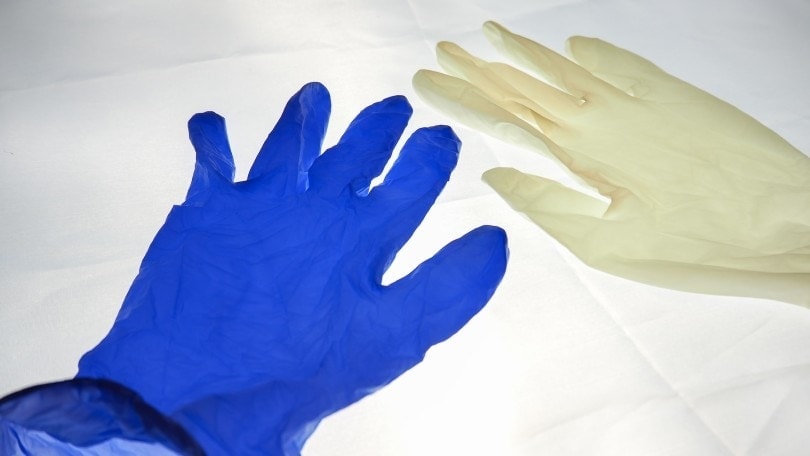
2. Clean the box at least once a day
Toxoplasma actually doesn’t become active until the feces have been lying around for at least 24 hours. Scooping the poop daily can prevent the pathogens from becoming viable.
3. Keep sandboxes covered and wear gloves while gardening
If your cat goes outdoors, they may claim your children’s sandbox or your raised garden bed as their outhouse. Make sure to cover any sandboxes to stop them being used as a litter tray. Even if you have an indoor cat, you should still wear gloves while gardening as other cats may have used the area.
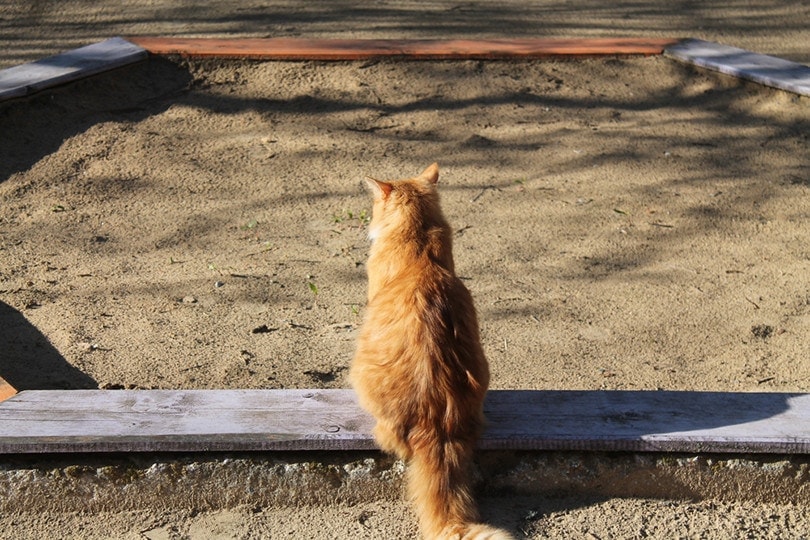
4. Avoid feeding your cat a raw meat diet while you’re pregnant
Toxoplasma is more likely to spread in the feces of cats who eat raw meat diets, so it is recommended that they eat cooked food or cat biscuits.
5. Keep your cat indoors, if possible
Cats are most likely to contract toxoplasma by eating mice or rats, so you can minimize your exposure by having an indoor-only cat. However, if your cat already has a habit of roaming the backyard, it is recommended having someone else clean out their litter box.
6. Wash your hands thoroughly after cleaning
We hope that you always wash your hands after changing your kitty’s litter, but it’s especially important to do so while you’re expecting.

7. Don’t forget to wash your produce and cook your meat to the proper temperatures
Remember, toxoplasma mostly spreads through ingesting infected food, so scrub those veggies and make sure the meat is fully cooked. Remember to clean work surfaces, utensils and chopping boards too.
Conclusion
While toxoplasmosis may not severely affect healthy adults, it can cause critical vision, hearing and neurological problems in infants. You should take extra precautions against toxoplasma while you’re pregnant, such as thoroughly cooking meat, washing vegetables, and either assigning someone else to the litter box, or always protecting yourself by wearing disposable gloves and a mask. Besides toxoplasmosis, other diseases and parasites may also be lurking inside your cat’s litter box. At the very least, you should always wash your hands after cleaning the litter box and take extra measures such as wearing gloves and a mask when you’re growing a baby. Speak to your health care provider for more information if you are concerned.
Featured Image Credit: Ninotee, Shutterstock












